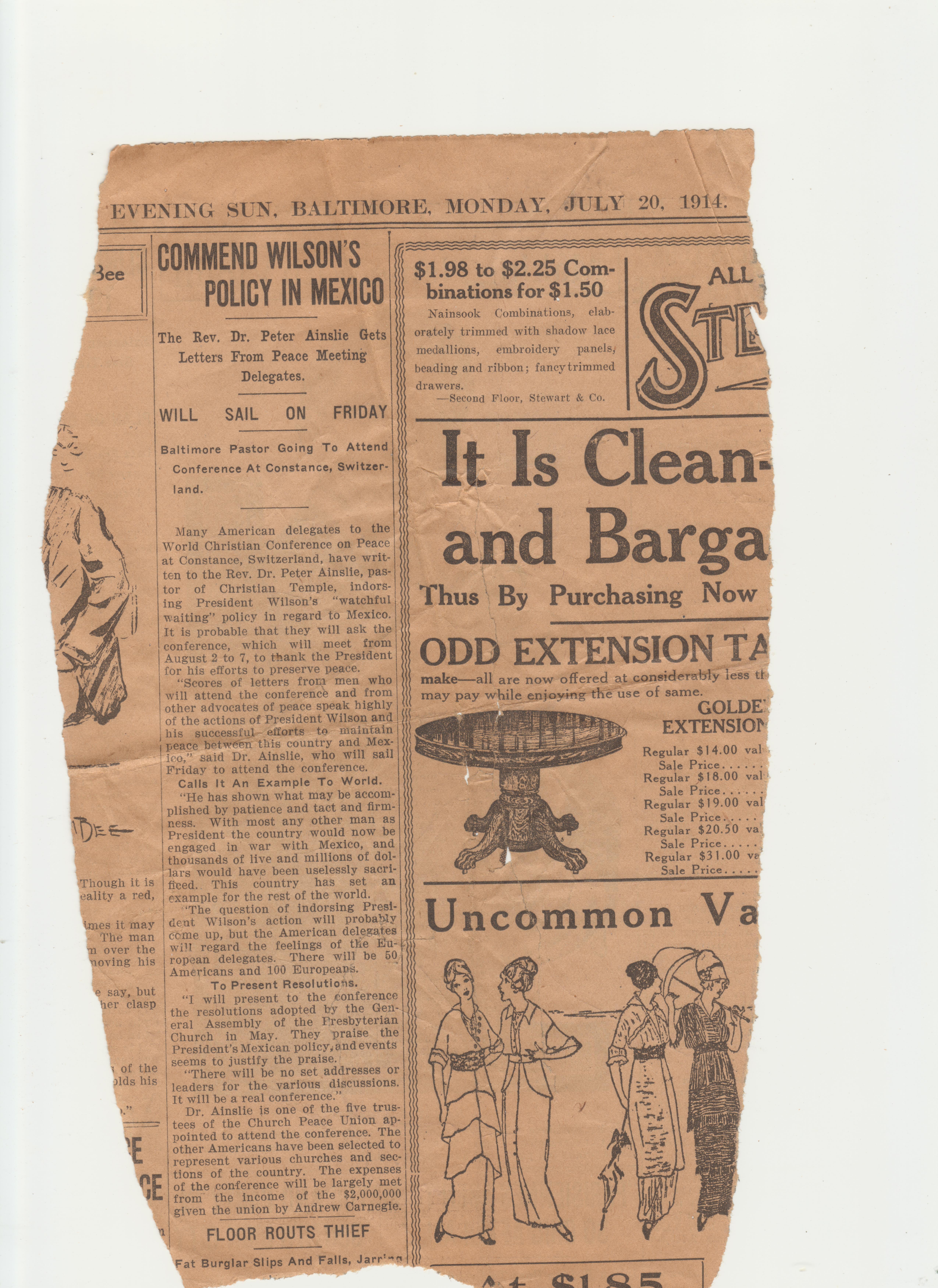Evening Sun, Baltimore – Monday, July 20, 1914
 This fragment of the Evening Sun, dated Monday, July 20, 1914, is historically significant because it places the article immediately before the outbreak of World War I (which officially began on July 28, 1914). It focuses on the World Christian Conference on Peace, scheduled to take place in Constance, Switzerland, and the participation of Rev. Dr. Peter Ainslie of Baltimore’s Christian Temple.
This fragment of the Evening Sun, dated Monday, July 20, 1914, is historically significant because it places the article immediately before the outbreak of World War I (which officially began on July 28, 1914). It focuses on the World Christian Conference on Peace, scheduled to take place in Constance, Switzerland, and the participation of Rev. Dr. Peter Ainslie of Baltimore’s Christian Temple.
Historical and Cultural Significance:
- President Woodrow Wilson’s cautious neutrality in the escalating tensions in Mexico (and by extension, globally) is endorsed by peace delegates.
- The World Christian Conference on Peace was one of the last international peace efforts held before the eruption of World War I.
- Dr. Ainslie’s leadership role and the American delegation’s involvement highlights progressive Christian activism in Baltimore, a movement that Jacob H. Buckner and his family may have been indirectly influenced by, as part of broader community engagement.
- The paper also reflects the intersection of religion, politics, and global affairs in early 20th-century America.
- The section’s inclusion in your Buckner archive suggests that it may have been preserved for its date or theme, or possibly due to Jacob H. Buckner’s or his associates’ involvement in peace or civic efforts.
FULL TRANSCRIPTION
EVENING SUN, BALTIMORE, MONDAY, JULY 20, 1914.
COMMEND WILSON’S POLICY IN MEXICO
The Rev. Dr. Peter Ainslie Gets Letters From Peace Meeting Delegates.
WILL SAIL ON FRIDAY
Baltimore Pastor Going To Attend Conference At Constance, Switzerland.
Many American delegates to the World Christian Conference on Peace at Constance, Switzerland, have written to the Rev. Dr. Peter Ainslie, pastor of Christian Temple, indorsing President Wilson’s “watchful waiting” policy in regard to Mexico.
It is probable that there will be action at the conference, which will meet from August 2 to 7, to thank the President for his efforts to preserve peace.
“Scores of letters from men who will attend the conference and from other advocates of peace speak highly of the actions of President Wilson and praise the settlement with Mexico,” said Dr. Ainslie, who will sail Friday to attend the conference.
“Calls It An Example To World.”
“He has shown that war may be accomplished by patience and firmness,” said Dr. Ainslie. “Had the President met the country’s mood and gone to war with Mexico, two armies of invasion and millions of dollars would have been uselessly sacrificed. He has set an international example the rest of the world may follow.”
The question of indorsing President Wilson’s course will probably come up at the meeting in Constance, with regard to the effort this peace conference delegates to be 50 from America and 1,000 from all the world.
To Present Resolution
“I will present to the conference a resolution adopted by the General Assembly of the Presbyterian Church in session at St. Louis, which indorsed the President’s stand, and events seemed to justify the praise,” he said.
Among the 50 addresses or discussions to be read at sessions of the conference, five will be from the United States.
Dr. Ainslie is one of the five members of the Church Peace Union, which was organized and endowed by Andrew Carnegie. Fifty other Americans have been selected to represent their churches and peace movements.
The endowment of the conference, the largest meeting of its kind ever held, is from the $200,000 given by Andrew Carnegie.
